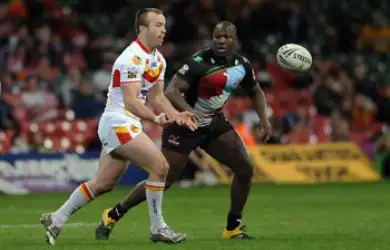Scottish players can’t simply become English

Ian Henderson has become the latest player to cause controversy by switching his international allegiance from one rugby league-playing nation to another. Henderson played for Scotland in the 2008 World Cup in Australia, but on Tuesday was named as part of Steve MacNamara’s 32-man England squad, named ahead of mid-season fixtures against the Exiles and a three-way autumn tournament against Wales and France. Henderson follows in the footsteps of Danny Brough, who made the same move this time last year (although injury kept him from pulling on the England jersey).
Henderson’s defection hasn’t gone down well with fans in this country and overseas. Even though this sort of thing has become common in rugby league- and in other sports – it seems people aren’t willing to accept a player switching from one country to another.
It’s never really troubled me that players can represent countries other than the country of their birth. For instance, I had no objection when Maurie Fa’asavalu played for Great Britain, or – more to the point – when Brough and Henderson, though born in England, chose to represent Scotland. Players can feel more attached to their adopted countries than their homeland, whether because of family connections or just through living there themselves. This is reflected in rules that allow players to represent the country of their parents or grandparents, or the country where they have been resident for a number of years.
I understand that there is some disagreement about this, and for some situations like this are just as ridiculous as the Henderson situation.
The difference though, in my opinion, is that Henderson – and Brough – committed to represent Scotland, and then reneged on that commitment when they realised they were good enough to be considered for the England squad. Fa’asavalu, by contrast, had never played rugby league for any other country when he decided to represent Great Britain. Whether he would have played league for Samoa given the chance (he represented his country of his birth at union) remains unanswered, but in my opinion that would have been wrong given his prior commitment to Great Britain.
I would endorse the argument that allowing players to switch from one nation to another – and presumably back again if things don’t work out – ruins the credibility of international rugby league. In this instance the more particular damage is being done to the Scottish side, who are made to serve as effectively England’s feeder team.
We’re all aware that the gap in quality between Scotland and England does in practice render a move from the former to the latter a step up in quality, but international representation shouldn’t governed in that way. We are after all talking about two independent league-playing nations in the RLIF rankings,. After all, switching from England to Australia is also a step up in quality, but we wouldn’t be happy if James Graham played NRL for a few seasons and then did it.
It was different when Scotland – along with Wales, Ireland and an England team – underpinned a Great Britain & Ireland side: it made sense if those sides were feeder sides to Great Britain. But England is not Great Britain, and players who choose to be Scottish can’t then choose to be English.
It’s the Scottish Rugby League who are the victims in all this. They must have lost confidence in keeping any talented players, because such players realise that it’s acceptable for them to defect to England whenever they feel ready. The solution is to ensure that players can only elect to represent one country, and that they stick by that decision. While that may mean young English-born players no longer elect to play for Scotland, at least the Scottish Rugby League know that those who do are committed, and are insured against disappointment in years to come.
Keep Your Eye on Rugby League
Twitter: Tony_LoveRL